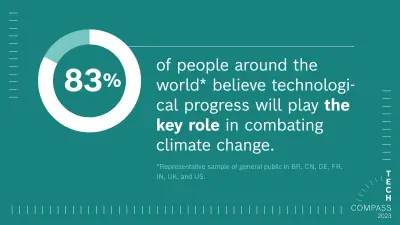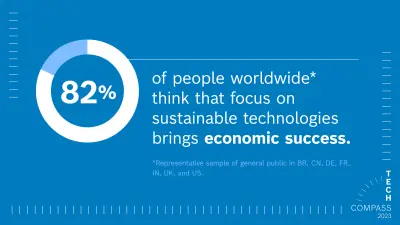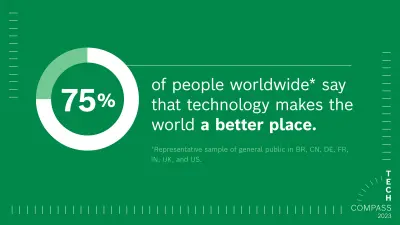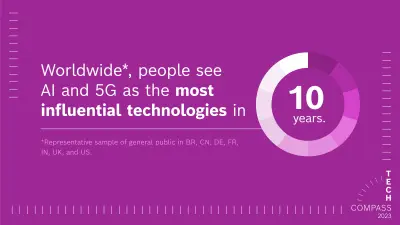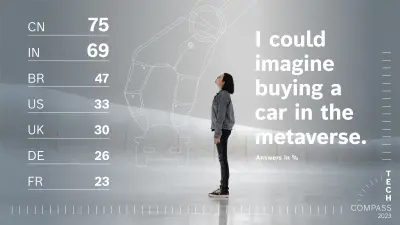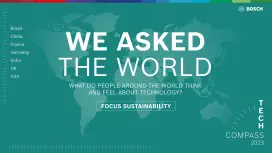Technology report: What does the world think about technology?
Representative survey in Brazil, China, France, Germany, Great Britain, India, and the US about technology with the focus on sustainability

How is technology affecting the lives of people? For the second time, Bosch has asked people in a representative survey in various countries what they think and feel about technological progress, what role sustainability plays in this, and what they expect from tech in the future. The technology report reveals a variety of perceptions between countries and the influence of single key technologies.
Highlights of the study
Does tech make the world a better place?
The vast majority of respondents worldwide (75%) believe that technology makes the world a better place. This means that confidence in technology is up by three percentage points compared to the previous year.**
Is technology the key to combating climate change?
Eighty-three percent of respondents worldwide believe that future technological progress will play the key role in combating climate change — seven percentage points more than last year.**
Does focusing on sustainability result in economic success?
The vast majority of respondents worldwide (82%) believe that the more a company focuses on sustainable technologies, the more economical success it will have in the future.
“Companies shouldn’t have to choose between being profitable and doing what’s best for the planet. If the right path is chosen, both aims go hand in hand.”
Tech and energy: differentiated picture around the world

A trend towards renewable energies has been initiated in many parts of the world, but people do not yet want to write off nuclear power and fossil fuels such as gas and oil for energy production completely. This is what the Bosch Tech Compass 2023 shows.
Sixty-two percent of those surveyed would like to see solar power fostered, while 44% would like to see wind power technologies promoted. A direct comparison of countries, however, reveals a differentiated picture: in China (36%) and France (31%), the call for the support of nuclear power technology is comparatively strong (globally: 23%), while Americans (oil: 21%, gas: 24%) and Indians (oil: 22%, gas: 23%) more often want to see oil and gas technologies fostered. In Germany, on the other hand, the desire for nuclear power (13%) and fossil fuels (oil: 4%, gas: 8%) is weak. Many Germans would like to see the expansion of solar and wind energy (solar: 63%, wind: 50%) as well as hydrogen (51%).
Mobility in the metaverse
The Bosch Tech Compass also provides interesting insights beyond the topic of sustainability — for example, regarding the Metaverse. In this virtual world in which people interact as avatars in a three-dimensional space that mimics reality, the topic of mobility also plays a role: Forty-three percent of those surveyed can imagine buying a car for the Metaverse. The willingness and interest are particularly high in China (75%) and India (69%). Even if the respondents in Brazil (47%), the US (33%), the UK (30%), Germany (26%), and France (23%) are currently more reserved, the figures nevertheless show that the desire for a car exists not only in the real world, but also in the virtual world.

Key facts
Study design
For the Bosch Tech Compass 2023, people aged 18 and over in seven countries (Brazil, China, France, Germany, India, the United Kingdom, and the United States) were surveyed online in September 2022 by Gesellschaft für Innovative Marktforschung mbH (GIM) on behalf of Robert Bosch GmbH. In Germany, France, and the UK, 1,000 people each were surveyed, and in Brazil, China, India, and the US, 2,000 people each. The samples are representative of the respective country in terms of region, gender, and age (BR, DE, FR, UK, US: 18–69 years/CN, IN: 18–59 years).

Get in touch
Christiane Wild-Raidt
Spokesperson, Research and Advance Engineering and Artificial Intelligence
*Representative sample of general public in BR, CN, DE, FR, IN, UK, and US.
**For ease of reading and interpretation, the global index for 2023 based on seven countries is compared with the index of 2022 based on five countries. Calculating a global index for 2023 based on the five previous countries provided equivalent results.
Picture credits: Michelangelo Buonarroti, pexels.com / Stefan Stefancik, pexels.com / Alession Lin, unsplash.com / Guilherme Stecanella, unsplash.com / Timon Studler, unsplash.com / Omar Houchaimi, pexels.com / Mahdis Mousavi, unsplash.com / ThisisEngineering RAEng, pexels.com / Kourosh Qaffari, pexels.com
